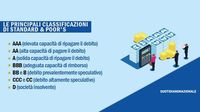On April 12, 2025, the Bank of Italy's governor, Fabio Panetta, expressed that he was "not surprised" by Standard & Poor's (S&P) decision to upgrade Italy's sovereign credit rating from BBB to BBB+, indicating that the country's economic conditions have significantly improved over the past 15 years. Speaking at the Festival dell'Economia in Trento, Panetta noted that the management of public finances has become more prudent, leading to better performance in various sectors.
Panetta highlighted that Italy's banking sector is now well-capitalized, and the number of insolvent businesses has decreased. He emphasized a remarkable shift from a debtor position to a net creditor status, with a net position equal to 10% of the country's GDP. This transformation occurred without a crisis, driven instead by growth and increased exports. "We see what happens in the global economy; let’s not put limits on providence," he stated, reflecting optimism about Italy's future.
On April 11, 2025, S&P Global Ratings raised Italy's long-term sovereign ratings in both foreign and local currency from BBB to BBB+ and affirmed the short-term ratings at A-2, with a stable outlook. This decision reflects improvements in Italy's economic, external, and monetary reserves, especially in the face of increasing global challenges. S&P noted that the Italian government's serious approach to fiscal policy has played a crucial role in this positive assessment.
Giancarlo Giorgetti, the Minister of Economy and Finance, commented on the rating upgrade, stating that it rewards the government's commitment to prudent fiscal management. He acknowledged the ongoing uncertainty in the global economy, underscoring that caution and responsibility will continue to guide Italy's economic strategy.
S&P's analysis also pointed to the suspension of tariffs by the Trump administration as a mitigating factor for Italy's economy. The agency indicated that this suspension would make the economic impact manageable, supported by increased public investment and fiscal stimulus from Germany. S&P forecasts that Italy's debt-to-GDP ratio will stabilize starting in 2028, despite the ongoing challenges posed by high public debt levels and demographic issues.
Moreover, S&P's report emphasized the political stability of Prime Minister Giorgia Meloni's government, which enjoys solid public support and a stable parliamentary majority. This continuity is expected to help maintain financial market stability and foster gradual economic progress. S&P's projections suggest that Italy's GDP growth will be around 0.6% in 2025, although the report warns of potential slowdowns if export tensions rise.
Despite the positive outlook, the government has tempered its expectations in its public finance document (Dfp). The Dfp estimates a modest GDP growth of 0.25% in the first quarter of 2025, with a projected increase to 0.6% by year-end. However, it also indicates that if export tensions escalate, growth could drop to 0.5% in 2025 and 0.6% in 2026, impacting the deficit and debt levels.
In terms of fiscal measures, the government has pledged to strengthen policies aimed at supporting families and enhancing employment opportunities for young people and women. However, the Dfp also highlights shortcomings in the Transizione 5.0 incentives for businesses, where only 500 million euros of the 6.3 billion euros allocated were utilized, and a mere 13% of eligible parties participated in the tax settlement program.
Panetta's remarks about Italy's economic transformation were echoed by S&P, which noted that the upgrade reflects not only improved economic conditions but also the stability of the political landscape. The agency's assessment underscores the importance of Italy's membership in the European Economic and Monetary Union (UEM), which bolsters its economic resilience.
As Italy navigates through these complex economic conditions, the government remains focused on maintaining fiscal discipline while addressing emerging challenges, including potential trade disputes and global economic uncertainties. The outlook remains cautiously optimistic, with officials committed to fostering an environment conducive to sustainable growth.
In summary, Italy's recent credit rating upgrade by S&P signifies a recognition of the country's improved economic management and political stability. While challenges remain, the government's commitment to prudent fiscal policies and strategic investments positions Italy for potential growth in the coming years, provided it can effectively manage external pressures and uncertainties.








